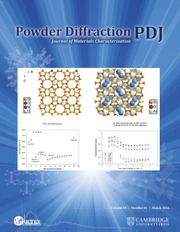Article contents
Structure determination from X-ray powder diffraction, DFT calculation, and Hirshfeld surface analysis of two fused bicyclic and tricyclic compounds
Published online by Cambridge University Press: 28 February 2017
Abstract
Crystal structures of two fused cyclic systems have been determined from X-ray powder diffraction data and their molecular geometries and intermolecular interactions have been analyzed by solid state DFT calculation and Hirshfeld surface evaluation, respectively.

Crystal structures of two fused cyclic compounds, 4-(methyl(sulfonyl)methoxy-2-vinyl)-2S*,3aR*,4S*,5,7aS*-(hexahydro-1H-indan-3a-yl)methylmethanesulfonate (1) and (1S*,2S*,4S*,7R*)-7-(dimethyl(phenyl)silyl)-4′,5′-dihydro-2′H-spiro[bicyclo[2.2.1]hept[5]ene-2,3′-furan]-2′-one (2), have been solved from laboratory X-ray powder diffraction data using direct space approach and refined following the Rietveld method. In the absence of strong hydrogen bond donating groups, the crystal packing of 1 and 2 exhibits C–H ⋯ O hydrogen bonds and C–H ⋯ π interactions forming two-dimensional (2D) supramolecular network. The nature of intermolecular interactions in 1 and 2 has been analyzed through the Hirshfeld surface and 2D fingerprint plots. The density functional theory optimized molecular geometries in 1 and 2 agree closely with those obtained from the crystallographic study. Hirshfeld surface analysis of 1, 2 and a few related fused carbocyclic and carbooxacyclic systems retrieved from the Cambridge Structural Database indicates that about 85% of Hirshfeld surface area in these compounds are because of H ⋯ H and O ⋯ H interactions.
Keywords
- Type
- Technical Articles
- Information
- Copyright
- Copyright © International Centre for Diffraction Data 2017
References
- 1
- Cited by



